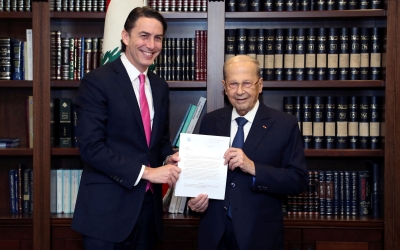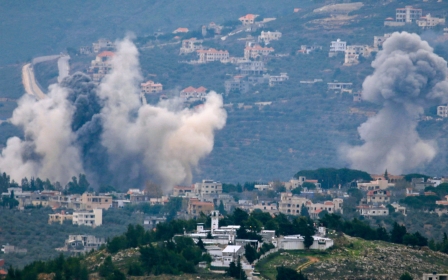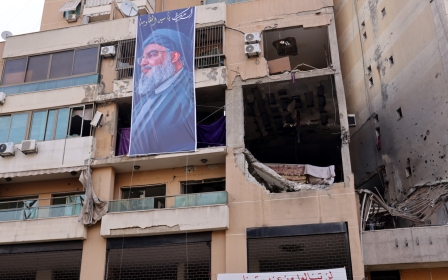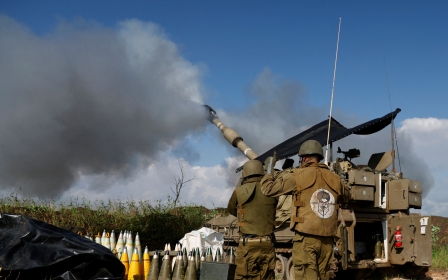Israel-Palestine war: Pressure mounts for diplomatic solution on Lebanon-Israel border
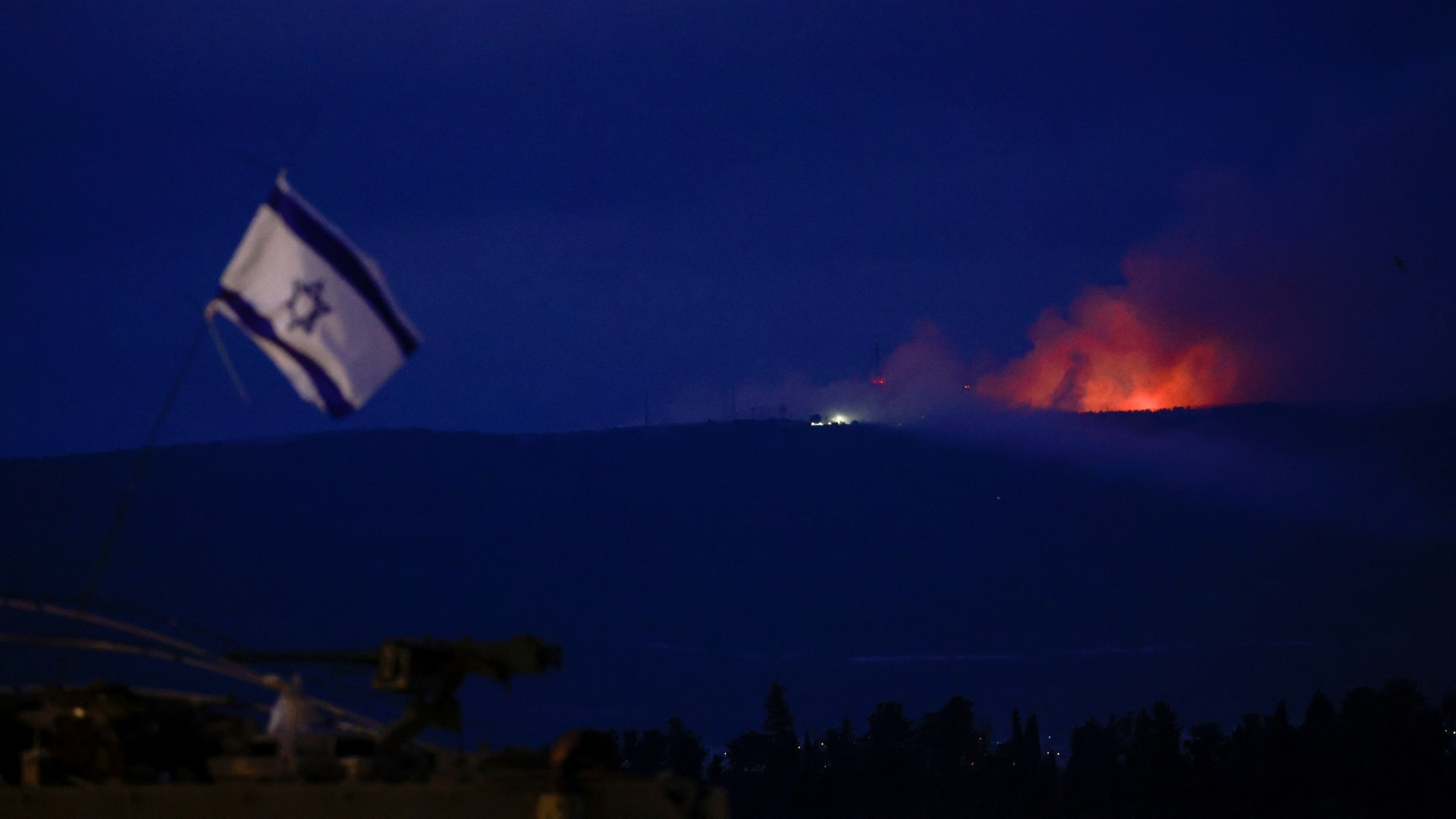
Lebanon’s southern border with Israel is a ticking time bomb as the clock counts down in the absence of a diplomatic solution. Fighting between the Lebanese group Hezbollah and Israel has been escalating incrementally since 7 October, when Hezbollah was pulled into Israel's war on Gaza.
Israel’s Defence Minister Yoav Gallant on 30 January said the Israeli army was readying for a potential war with Hezbollah and on 2 February announced that Israel will continue its destructive military campaign in Gaza’s southernmost city of Rafah, despite the nearly one million civilians who are sheltered there and have nowhere else to go.
After a heavy day of fighting on Israel’s northern front on Sunday, Gallant warned Israel still had many offensive tools to use at its disposal. He also reiterated that a ceasefire in Gaza would not lead Israel to stop attacks on Hezbollah, saying the fighting would continue until residents of northern Israel could return “safely to their homes”.
But Hezbollah leader Hassan Nasrallah made a surprising announcement during his speech in January, signalling his openness to border negotiations with Israel. He has tightened this proposition in successive speeches, clarifying that talks could not happen until Israel ceased hostilities in Gaza.
A deal to resolve the disputed points along the “blue line” - the demarcation line dividing Lebanon, Israel, and the Golan Heights and drawn by the UN in 2000 - could ward off what seems to increasingly be an imminent war.
New MEE newsletter: Jerusalem Dispatch
Sign up to get the latest insights and analysis on Israel-Palestine, alongside Turkey Unpacked and other MEE newsletters
Nasrallah’s acceptance of border negotiations, even if after the war, is a departure from his previous stance of not wanting to negotiate land borders, Randa Slim, an analyst with the Middle East Institute, told MEE. The Hezbollah leader has been open about maritime border negotiations, she said, but his acceptance of land border negotiations is new.
“The Lebanese government cannot engage in these negotiations without Hezbollah’s permission,” Slim said, which gives greater weight to Nasrallah’s nod in his statement.
Meanwhile, as Israel’s patience runs thin, it has grown increasingly aggressive, entering a new phase of targeted attacks. In early January, Israel assassinated Hamas leader Saleh al-Arouri in the Beirut neighbourhood of Dahiyeh, an attack Hezbollah’s leader Nasrallah said “will not go unanswered or unpunished”.
Follow Middle East Eye's live coverage of the Israel-Palestine war
Nasrallah welcomed Israel’s threats in his last speech on 14 January. “We don’t fear war and there are no talks before the war on Gaza ends,” said Nasrallah, who leads the world’s most heavily armed non-state actor.
“If there is no agreement, then the pressure is really going to be on for the Israeli government to send the army into south Lebanon,” Hezbollah expert Nicholas Blanford told MEE.
“Even if it is just a limited campaign, a limited campaign can increase its scale very easily and become unlimited,” he said.
US envoy in Beirut
Nasrallah’s rare statement came just days before US envoy Amos Hochstein landed in Beirut to discuss a diplomatic solution for southern Lebanon, in a bid to restore calm to the region. In a series of meetings with Lebanese parliamentarians, including those close to Hezbollah, Hochstein laid out a pathway to cool the situation along the border.
Since Hamas’s 7 October incursion into Israel, Israeli officials have discussed launching a preemptive attack on Hezbollah, according to The Washington Post. Their threats have faced sustained opposition from the US, which fears an explosion of an “all-out” war in Lebanon would draw in Iran and compel the US to enter on Israel’s behalf.
So, hopes were high for Hochstein when he landed in Beirut. The envoy had successfully brokered a maritime border demarcation deal between Lebanon and Israel in 2022, and in August set foot in Beirut again to break the ice on a land border demarcation.
While Hezbollah rejected Hochstein’s initial proposals for limited hostilities at the Lebanon-Israel border, according to Reuters, the Lebanese armed group is still “not closing” the doors on diplomacy to avoid a wider war.
“It’s clear that Hezbollah wants to avoid a full-scale war with the Israelis,” Blanford said. He added that Iran also does not want to see Hezbollah, its most important proxy, dragged into a full-scale war, as it could erode a key component of Iran’s deterrence architecture.
“But to end this, both sides, Hezbollah and the Israelis, have to come out with a win they will have to sell to their respective audiences,” Blanford stated.
Hochstein could be back in Lebanon late this week, if his visit to Tel Aviv goes well, according to sources quoted by the Lebanese news outlet Naharnet.
Time is ripe
Public pressure is mounting in both Lebanon and Israel from four months of fighting along their shared border, pushing talks into motion. The fighting has displaced over 86,000 Lebanese and anywhere from 60,000-96,000 Israelis from their homes.
Although Hezbollah began as a movement of armed resistance to the Israeli occupation, it has developed into one of the country’s strongest political parties. The party must continuously balance its international obligations as Iran’s leading proxy with the desires of its domestic constituency.
In this respect, Nasrallah’s recent indications of his willingness to engage in border diplomacy are to help shape a domestic narrative that Hezbollah's involvement is not just to support Hamas, but also for Lebanese interests, Slim said.
“Hezbollah considers the liberation of the occupied territories from Israel an important achievement. If achieved, this will confirm that what it did to support the Palestinian people was also in the interest of Lebanon,” Kassem Kassir, a Lebanese analyst reputed to be close to the party, told MEE.
'It’s clear that Hezbollah wants to avoid a full-scale war with the Israelis'
- Nicholas Blanford, Hezbollah expert
Although support for Hezbollah, a Shia Muslim party, is sharply divided across sectarian lines - with the vast majority of support among Lebanon’s Shia populations - there have been long-standing efforts by the group to gain support in both Christian and Sunni Muslim communities.
The party does not want to feed the criticism, especially coming from its Christian political opponents, of dragging Lebanon into an unwanted war amid one of the world’s worst economic crises.
Israel is also under “enormous pressure”, considering the hundreds of thousands displaced from both the country’s northern and southern borders and significantly, the remaining Hamas hostages in Gaza, David Schenker, a fellow at the DC-based Washington Institute, told MEE.
For those Israelis who reside in the north, Hezbollah’s presence along the border is “intolerable”, he said, especially considering the psychological impact of Hamas’s attack in the south of Israel. “Hamas took a page out of Hezbollah’s playbook,” Schenker stated.
What’s on the table?
US envoy Hochstein, during his visit to Beirut, suggested the land border be negotiated after the cessation of hostilities. This would include resolving the 13 disputed points and answering the question of Shebaa Farms and Kfrarchouba Hills, which are occupied by Israel, claimed by Lebanon, and internationally considered part of Syria, according to the Lebanese French daily, L’Orient-Le Jour.
Also critical in the negotiations would be restoring Lebanon’s control over the northern part of Ghajar city, which Israel constructed a wall around in July. The northern part of the city is on the Lebanese side of the blue line drawn by the UN in 2000.
Ahead of Hochstein’s visit to Beirut, Lebanon’s caretaker prime minister, Najib Mikati, whose diplomatic endeavours have been endorsed by Hezbollah, reaffirmed that a diplomatic solution would need to be “lined to an end to [Israeli] aggression in Gaza”, and would “go back to the armistice agreement [of 1949] and to the pre-1967 situation [in south Lebanon]”. This referred to the armistice line or “green line” drawn prior to Israel’s occupation of the Golan Heights in 1967.
Israel wants Hezbollah’s elite Radwan force, which has an estimated 2,500 fighters, to move north of the Litani River, about 30km from the border, as mandated by UN resolution 1701. Israel has said it will accomplish this either by a diplomatic solution or if a solution fails, a majority military offensive.
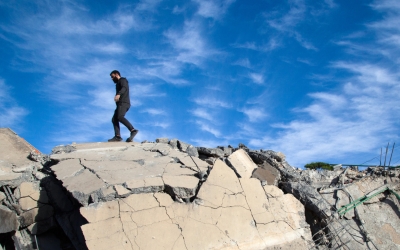
Kassir, the analyst close to Hezbollah, said the party "does not mind withdrawing from the border area". Although varying reports have been floated about how far Hezbollah might be willing to withdraw. It's also been reported that the talks focused on a more limited Hezbollah withdrawal of about 10km past the UN-drawn blue line.
Blanford said that Hezbollah may be willing to move back from the border, in return for Israeli concessions. He said these concessions could involve ending Israeli violations of Lebanese airspace and an Israeli withdrawal from northern Ghajar and the Shebaa farms - all of which Israel is likely to do “now more than any time in the past”.
“Hezbollah can sell this to their domestic audiences and say ‘look, the resistance works and it’s the only language the Israelis understand’,” Blanford said.
Israel is also not aiming for the “total disarmament of Hezbollah”, Blanford added, rather, just pushing them back from the immediate border areas, out of firing range of Israel’s northern villages.
“It’s really down to perception,” he said, explaining that if Hezbollah was to go “invisible again” and not rebuild the bases and observation posts they have set up in the last months, it might be enough for Israel to convince its evacuees to return.
However, Schenker was less optimistic. “No one believes the Radwan forces wouldn’t return to their posts,” he said. “There’s zero confidence in Unifil’s performance,” he added, noting that the UN peacekeeping force had more peacekeepers per kilometre than anywhere else in the world in Lebanon’s south. Hezbollah was required to disarm as per UN resolution 1701, but that has not been the case.
“They (Israel) won’t allow for the creeping violations overseen by a conflict-averse UN,” Schenker stated.
“There needs to be verifiable measures [on the Lebanon-Israel border] or Israel will take kinetic action to implement these measures themselves.”
This article is available in French on Middle East Eye French edition.
Middle East Eye delivers independent and unrivalled coverage and analysis of the Middle East, North Africa and beyond. To learn more about republishing this content and the associated fees, please fill out this form. More about MEE can be found here.


